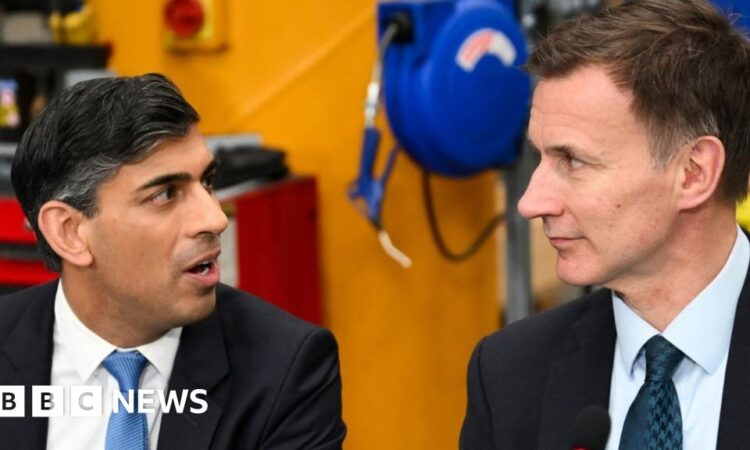
- By Chris Mason
- Political editor, BBC News
Rishi Sunak and Jeremy Hunt have been strongly hinting they want to deliver tax cuts for millions
The Chancellor is exploring the option of scrapping the tax status enjoyed by people who live in the UK, but whose home for tax purposes is overseas.
Non-domiciled people, often referred to as non-doms, only pay UK tax on money earned in the UK.
They do not have to pay any tax to the UK on money made elsewhere.
Perhaps the UK’s most famous non-dom is Rishi Sunak’s’ wife, Akshata Murty – but two years ago, she committed to paying UK tax on her overseas income.
Conservatives, including the Chancellor Jeremy Hunt, have long defended the non-dom arrangements, saying they helped ensure the UK was an attractive place for highly sought after, well off people to choose to live and work.
Mr Hunt remains committed to ensuring his policies don’t undermine this.
But, ahead of the Budget next week, Treasury officials are exploring a range of options to either generate more money in tax or reduce spending – in order to be able to afford tax cuts for millions of people.
Recent figures produced by the Office for Budget Responsibility have revised down the scope for mass market tax cuts, unless extra money is found.
For months both the Chancellor and the Prime Minister have been strongly hinting they want to deliver tax cuts.
So, among the options to address this conundrum are:
- Cutting the spending assumptions in government departments over the next five years.
- And scrapping non dom tax status.
The Chancellor is still due to be presented with more data by the OBR in the next few days and he has not yet committed to anything on non doms.
But neither has he ruled it out.
Politically it is fascinating: it shows what a bind he is in, considering an idea he has long rejected.
But were he to plump for it, it would pose a dilemma for Labour – because it would amount to nicking one of their ideas and so leave them with their own funding conundrums if they also backed any tax cuts the Chancellor also announced, which they are expected to.
It is expected Labour’s message at next week’s Budget will be a familiar refrain – asking voters if they feel better off than at the last general election, or even than back in 2010, when the Conservatives came to power.
They believe most people will answer that with a no, whatever the Chancellor is able to promise.






